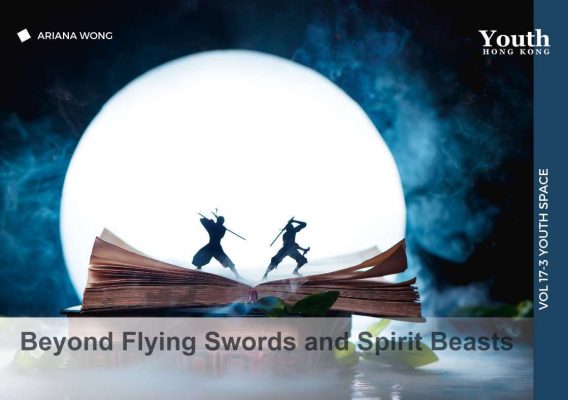by Ariana Wong
In this love letter to Xianxia, Ariana explains why this genre of Chinese fantasy resonates so deeply with younger generations.
White robes flutter like whispers across the ink-black sky. Silver swords clash under a sleepless moon. Intricate dances woven by footsteps cast shadows on misty mountaintops. Here, mortals chase immortality, love defies fate, and battles are fought with both blade and soul. This is Xianxia (仙俠) — a breathtaking world where myth, philosophy, and fantasy intertwine.
But what exactly is Xianxia? It’s often confused with Wuxia (武俠), a type of Chinese fiction about the adventures of martial artists. As someone who’s hopelessly obsessed with the genre, I get asked this a lot, and I always answer: If Wuxia is a poetic sword fight beneath falling plum blossoms, then Xianxia is a celestial war written across galaxies of fate. While both explore martial prowess, Wuxia stays grounded in history, where warriors uphold honour and justice through swordsmanship. Xianxia, however, is otherworldly. Deeply rooted in Taoist ideas and ancient folklore, heroes cultivate spiritual energy, tame mythical beasts and fight to ascend toward immortality.
My love for this mysterious new world all began with a click. It was 2020. The world outside was crumbling, and I was stuck indoors like everyone else. I was scrolling aimlessly online, numb from another western fairyland filled with British accents and blonde princesses. I craved something more — more magic, more depth and more soul. Then I found The Untamed (陳情令). I clicked, watched and fell deep in.
It was a lingering pluck of the Chinese guqin (古琴), light but playful, like mist drifting over still water. Wei Wuxian, the male protagonist, appeared with a mischievous grin beneath moonlit scrolls. Together with Lan Wangji, they wandered through jagged peaks and winding rivers, their friendship unfolding delicately between order and chaos.
Then a single string trembled. The harmony twisted into dissonance. The rise of the Wen clan brought bloodshed in the name of power. Wei sacrificed his cultivation for his brother — a decision that would haunt him for the rest of his life. The rhythm of the guqin quickened into fury. The tension between Wei and Lan simmered beneath words left unsaid. Sworn promises were exchanged under moonlight. Every stolen glance and every fleeting brush of fingers spoke of betrayal, of sacrifice.
And then, as if the heavens themselves exhaled, the melody rose again — this time filled with emotion too deep for words. There was a rebirth. There was Lan’s unwavering presence. There was hope. And finally, there was love. By the time the final note faded into stillness, I had fallen utterly and irrevocably into the world of Xianxia.
It is no surprise that the Untamed had, by the end of 2020, garnered over 9.5 billion views on Tencent Video alone. Subtitled in more than 12 languages, it captured hearts across Asia, Europe, and North America. It didn’t stop there. Shows like Love Between Fairy and Devil (蒼蘭訣) and Till the End of the Moon (長月燼明), continued the wave, with platforms like iQiyi now streaming over 15,000 hours of Chinese content a year, with nearly 40% of it being Xianxia. This isn’t merely a phrase. It’s a global wave.
Success also brings challenges. Accompanying its expanding popularity is also the criticism about tradition and modernity, the fading of the original Xia spirit, particularly the deep-rooted values of loyalty and justice that once defined many classic stories. It saddens me. Yet, I don’t believe all hope is lost.
For starters, some Xianxia dramas retain traditional elements, such as classical speech patterns and ceremonial rites, while elevating their visual storytelling through dynamic cinematography and artful colour grading. Love Between Fairy and Devil, for instance, isn’t just visually stunning — it has that dreamlike, otherworldly feeling that makes the celestial world feel both ethereal and mesmerising. More importantly, the stories are evolving too. Yes, they still explore cultivation, reincarnation, and the pursuit of eternal existence. But increasingly, they challenge black-and-white morality and reflect contemporary themes.
Till the End of the Moon gave us Tantai Jin — not a one-dimensional villain, but a tragic figure shaped by trauma. His story forces us to grapple with the idea that evil can be born from pain, and how redemption, even for the darkest hearts, is possible. Other stories highlight love and peace, and the acceptance of being “imperfect.” As a result, not only does this expand the emotional depth of Xianxia to stay relevant in a globalising world, but it also preserves their roots in Chinese folklore.
Not to mention, as a 16-year-old fantasy lover, I truly hope that more and more younger generations can appreciate the beauty of these dramas. For me, it’s not just the flying swords or mythical creatures, but the way these stories reflect our struggles.
In Xianxia, every protagonist starts as a nobody. Through years of arduous cultivation, they grow and climb toward understanding and purpose. Isn’t that what growing up feels like? Additionally, the game-like storytelling also connects with Gen Z in fun new ways, portraying romantic encounters vividly and concretely. Love Between Fairy and Devil felt almost like a live role-playing game, with quests, levels and hilarious romantic challenges. At first, the male lead Dongfang Qingcang is bound to female protagonist Xiao Lan Hua through a heart spell and ends up doing silly things like fetching magical water and listening to her incessant chatter. Watching him go from an arrogant god to a flower soup-making boyfriend is both hilarious and heartwarming.
There are still endless ways that this type of Chinese fantasy can expand its audience to younger faces, such as mixing in horror, slapstick comedy or even everyday moments like tea chats between immortal beings. Somehow, it all fits. That’s the magic of it.
In a world obsessed with instant gratification, Xianxia reminds us to slow down, to grow, to fight for something bigger: truth, love and meaning. It whispers to us that the heart matters as much as the sword, that every scar is a story, that even though I am small, my journey can still be epic if I dare to believe.
As the guqin plays softly in my head, I imagine the white-robed heroes fading into the mist, and one thought lingers: Maybe, just maybe…we’re all cultivating something, even if it’s just the courage to dream. ■
 Ariana Wong, 16, from Heep Yunn School, is passionate about traditional Chinese mythology and Chinese dramas. Apart from street dancing, public speaking, or sipping cranberry juice while dreaming up fantasy worlds, she finds joy in sunrises and sunlight. Compassionate and carefree, she hopes to make others feel safe and inspired to discover their own potential.
Ariana Wong, 16, from Heep Yunn School, is passionate about traditional Chinese mythology and Chinese dramas. Apart from street dancing, public speaking, or sipping cranberry juice while dreaming up fantasy worlds, she finds joy in sunrises and sunlight. Compassionate and carefree, she hopes to make others feel safe and inspired to discover their own potential.


